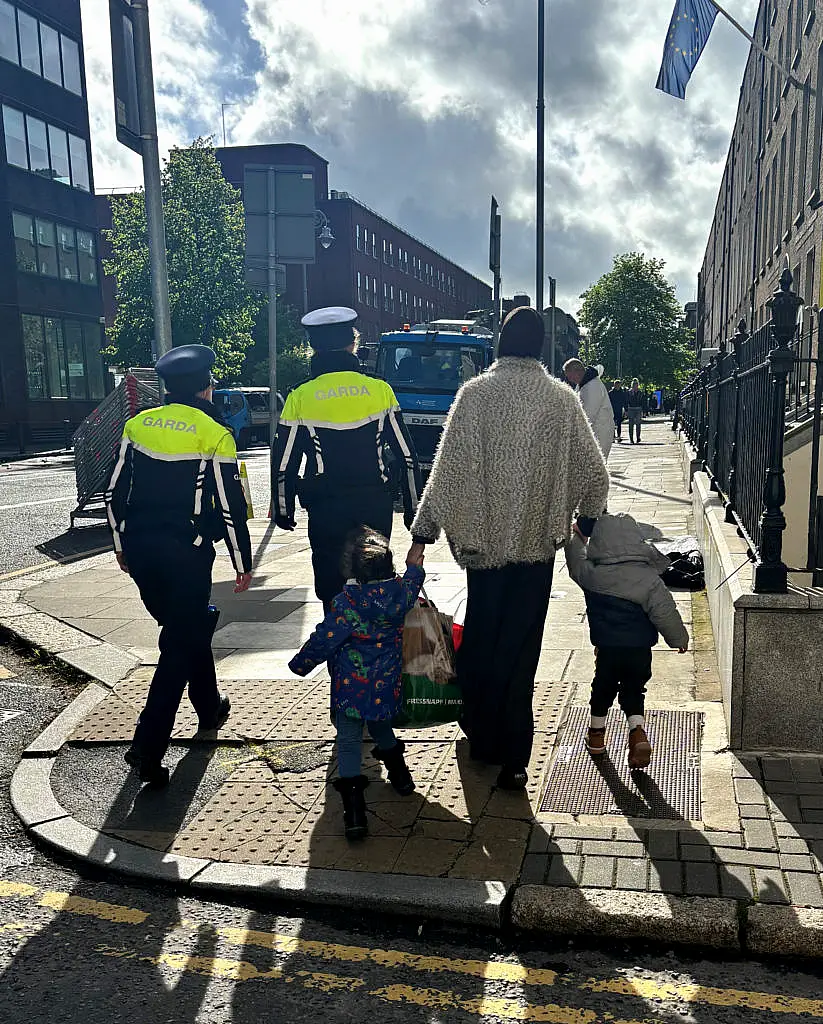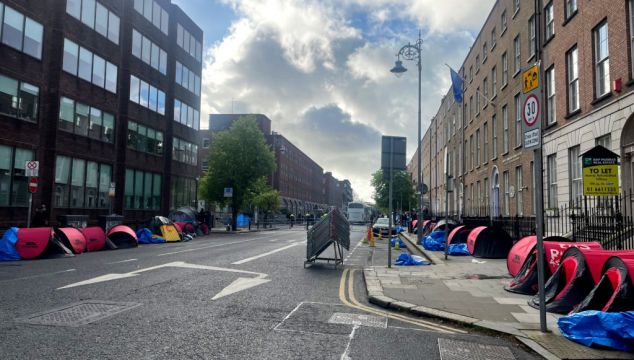Updated at 10:21
An operation was undertaken in Dublin on Wednesday morning to move hundreds of asylum seekers who had been sleeping in a large encampment of tents in the city centre.
In recent months, migrants have been sleeping rough beside the city’s International Protection Office on Mount Street as the state struggles to source enough accommodation for people seeking asylum.
The operation to move the makeshift camp that began early on Wednesday morning comes amid increasing diplomatic tensions between the UK and Ireland after the Government expressed concern about an upsurge of asylum seekers entering the state via the land border from Northern Ireland.
Council workers, some dressed in white overalls, were involved in clean-up efforts to remove the tents and wash down the camp area in and around Mount Street.
Asylum seekers congregated in groups waiting with their luggage as buses and taxis arrived to take them to another site where basic facilities will be offered.
Mount Street was cordoned off during the operation, with a large number of gardaí present.
Multi-agency initiative
A similar operation to remove tents from the area was undertaken in March, but another makeshift encampment soon built up again.
A Government statement outlined details of Wednesday’s operation: “A joint operation between the Department of Children, Equality, Disability, Integration and Youth; the Department of Justice; An Garda Siochana; Dublin City Council; the Office of Public Works; and the HSE (Health Service Executive) is under way on Mount Street, Dublin.
“The purpose of the operation is to ensure the safe movement of people seeking international protection from the tents on Mount Street to International Protection Accommodation Service (Ipas)-designated accommodation.
“The Ipas-designated accommodation has toilets and showers; health services; indoor areas where food is provided; facilities to charge phones and personal devices; access to transport to and from Dublin City Centre; and 24-hour onsite security.”
Labour Party leader Ivana Bacik said the encampment was “inhumane and unsustainable”.
“Glad to see alternative accommodation is now being provided by Gov, will press to ensure it is safe and secure,” she posted on X.

Noel Wardick, from Dublin City Community Cooperative, an organisation that has been providing support to the asylum seekers sleeping rough, said it was vital that the alternative accommodation was appropriate.
He said that was the key failure of the last removal operation in March.
“The jury is out. From our point of view we don’t know where the men are going.
“The jury is out. From our point of view we don’t know where the men are going.
“And we don’t know the conditions on the site. So we would expect that the state has provided sufficient sanitation, water, hygiene, and blankets, warm accommodation.
“However, that wasn’t the case on the 16th of March when they last dismantled the site in a very shambolic, ham-fisted and chaotic manner.
“So let’s hope all those lessons were learned, and the men are in a vastly improved situation.”
Minister for Enterprise and Employment Peter Burke said that while he did not know the details of where people were being moved from Mount Street, he was certain they would be well cared for, security would be provided, and they would have health care and wraparound services.
“There are a number of officially accredited IPASS areas where they have been taken, where they will have health care services, where they will have food, food, shelter and accommodation. That's so important for them. This has been a very difficult situation the government has responded to.
Vulnerable people
“We know that government has given 2500 beds, brought into circulation from the 1st of January. We have a significant challenge. Looking at pre-pandemic figures, it's up nearly 200 per cent. People come into our country and the government has prioritised women and children first.
“But it's important that we had a public safety issue in terms of people, very vulnerable people on Mount Street. It was a public health issue for them as well and for residents and area businesses.
"So I would welcome that those vulnerable people are being cared for and moved on because that's so important. We're dealing with human beings.”
When asked if the people being moved from Mount Street would be living in tents in the new location, Mr Burke said he did not have the details, but acknowledged that some would live in tents.
“I accept it's a very challenging situation, but the government is working. We have a rules-based immigration system. If you look at people who are designated in countries that have been fast tracked, safe countries, their applications have reduced by 50 per cent over the last number of weeks.
"And what does that prove? It proves that Ireland has a fair rules-based immigration system and we as a government are implementing that.
“But we are in a challenging environment. And the way we would resolve this is when we sign up to the asylum migration pact, because what that will do, it will allow us link into Europe, working together to get data sets and allow us to deal with secondary movements where people have applied for asylum in other countries, and we need to ensure that that's operational.”
The State will provide new accommodation, and new arrivals will “absolutely not” be going into tents on Mount Street, he said.

Aubrey McCarthy, the founder of Tiglin, the charity that helps people overcome addiction and homelessness, has described the situation on Mount Street as “absolutely untenable”.
The charity’s outreach hub in Pearse Street had over 500 people seeking assistance on Tuesday night, he told RTÉ radio’s Morning Ireland.
Mr McCarthy told of how he had observed the number of tents on Mount Street increase in recent days with tents doubling up on both sides of the street.
“At our outreach hub, which is the Lighthouse on Pearse Street last night, we had over 500 people queuing for hot food, clothing, sleeping bags, sanitary products. And also we are limited to three toilets.
"So there's a queue then of people trying to wash, trying to use the bathroom. And that certainly has doubled since the start of this year. So even in the last number of days, there has been a huge increase in tents on Mount Street.”
The situation was not sustainable, he said, as there were only two portable toilets at the back of Grafton Court, for the people sleeping in tents.
“I think the problem is, it is a perfect storm, our housing crisis, the numbers coming in. I think we've been sort of caught off guard. And now what's happened with the UK as well.”
The co-founder of the Movement of Asylum Seekers in Ireland, Lucky Khambule, has described the conditions for those living in tents on Mount Street as “really unbelievable”.
It was not the fault of the individuals seeking protection that the tents were in place. “They were given no options”, he told RTÉ radio’s Morning Ireland.
While Mr Khambule accepted that people had to be moved, he was concerned that there could be a repeat of the situation in March when people were moved to Crooksling, Tallaght, but subsequently returned to Mount Street.
“We are afraid that it might be the same thing as well. The fact that people are not told where they are going, no one knows where they are going. How safe will they be?
"They take into account the opposition that comes when people come in those areas. What about the communities in those areas that they're talking about? It's a dicey situation at the moment.”
Mr Khambule said that the facilities in Crooksling, to where people had been moved in March, had “improved tremendously”, with tents and beds and wash facilities. He hoped there was a plan in place for new arrivals. At present if a person presents at the International Protection Office, he did not know if accommodation was available.
If accommodation was not available then the person would end up on the street. “It will be up to the volunteers to find a place for that person, to feed that person. And the government won't be there. So I hope there is a plan for the people that will come today.”
Additional reporting from Vivienne Clarke







